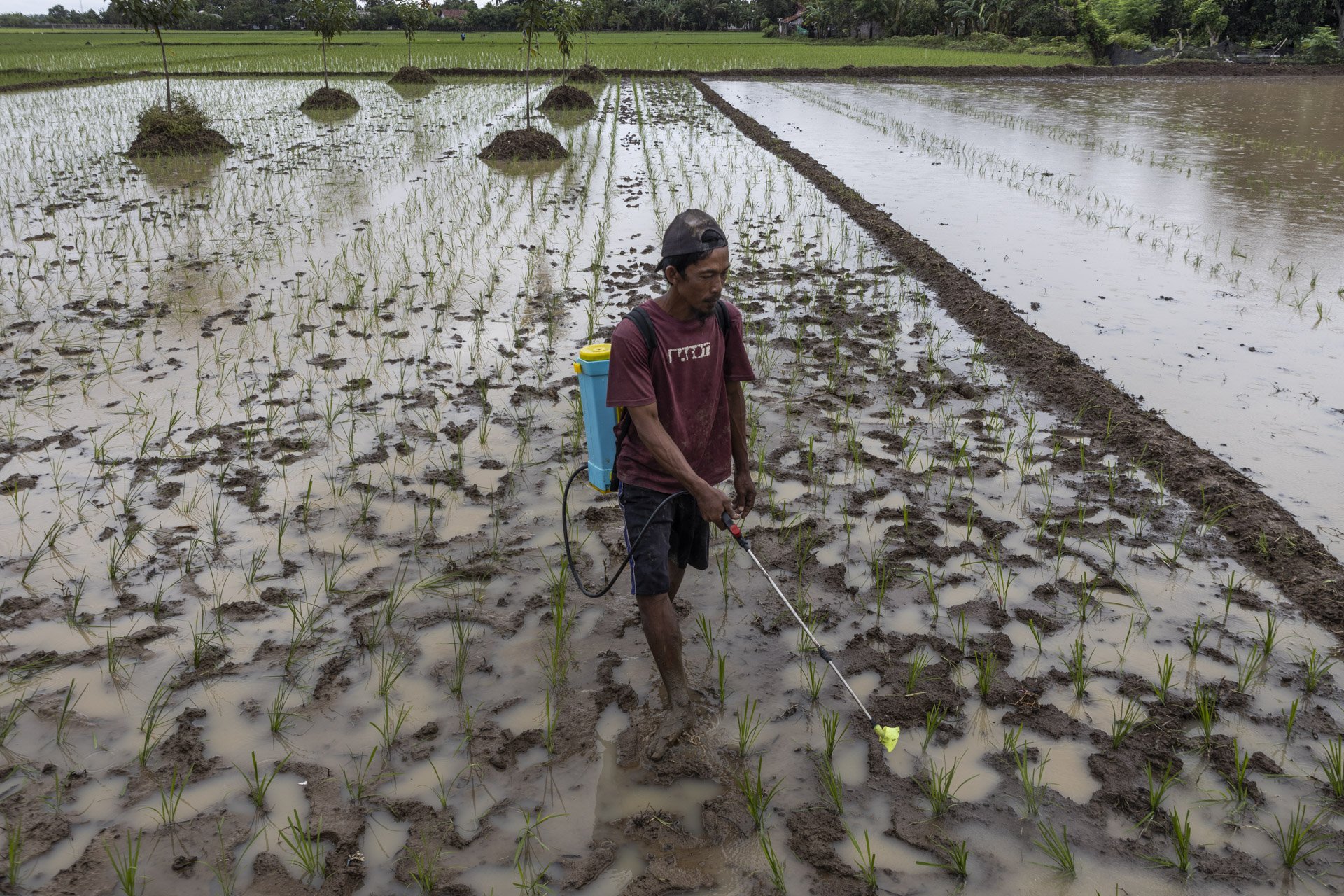
Early in the morning, a man sleeps along the bank of the Citarum River in Banding, Indonesia. During the rainy season, Bandung is often affected by flooding. The cause is the plastic and other waste people throw into the water, which blocks the flow.

.
Employees of the River Cleanup clean the water of a canal in the city of Bandung.

Employees of the River Cleanup clean the water of a canal in the city of Bandung.

When cleaning the water of the Bandung canal, employees of the River Cleanup separate the waste, including plastic, styrofoam boxes, etc... They currently store the plastic in a warehouse, waiting to find a way to recycle and become independent from the donations they receive from private companies.

Along the bank of the Citarum River, the Government built a high wall to discourage people from throwing trash into the water. Using the River as a dump is usual among those living near its waters. Some environmental groups have asked the Government to be more severe with those who still litter the waters of the Citarum River.

People have organised a waste collection service in some areas near the River. However, workers burn garbage near the River instead of taking it to a landfill or a waste-to-energy plant.

A worker collects the trash along the small alleys near the Citarum River, carrying it into a small cart. This part of the city neighbourhood pays a small fee for the service.

A tributary river pours chemical waste into the Citarum River. Plastic is one of many problems for the water's quality. In the Basin of the Citarum River, thousands of textile, pharmaceutical, and cosmetic companies use the River as sewage.

At KM 0 of the Citarum River, a boy from a nearby village walks back home in the rain after having caught two fish in the clear water of the Cisanti Lake.

Two men exit from the water source. The pond where the water of the Citarum River gushes from the ground is a holy place where people perform a purification ritual, connecting with the strength of nature.

Kids are fishing in the Citarum River. Due to water pollution throughout the years, fish has decreased significantly.

Hujan Sukuri lives close to the Citarum River in Bandung. During the day, he digs the bottom of the River looking for "Cacing Sutra" Silkworms. A red-coloured worm that lives in the mud is used to feed fish. Nowadays, finding the same quantity is getting more complex than in the past. According to Hujan, the cause of the decrease in worms is the work of cleaning the River.

On Sunday morning, the inhabitants of the Sidang Reret Village clean the river water from waste. Early in 2022, the Government cleaned the waters by digging the bottom of the River. People have realised how better it is to live in a clean environment, and since then, they have started to keep the River clean, improving the quality of their lives.

After the Government cleaned the River around the Sidang Reret Village, Yusup, a former worker in a textile factory, decided to open a fishery. Thanks to the Citarum Harum Program of the Government, this is his only business now.

Workers carry trash collected from the waters at the entrance of the Saguling Lake. Citarum holds three hydroelectric power plants in its dams, providing electricity through Java and Bali. Trash is a threat to the maintenance of the turbines.

A platform collects trash near the first barrier from the Citarum River's water at the Saguling Lake entrance. Often, pieces of trash break the machine, and workers must continue to collect trash manually. Only this machinery, when working, can extract between 500kg and 1 ton of waste from the water daily.

A man checks the fish in one of the fisheries in Cirata Lake.

When the government opened the hydroelectric power plant in 1988, it had to relocate thousands of families who lived in the villages along the Citarum River. Today, many of those families live in floating villages on Cirata Lake.

Men play cards at the end of the day in a floating house in Cirata Lake.

Ibu Siti (L) prepares dinner with Ibu Aci (R) while Azkiya, Ibu Siti’s daughter, plays in the kitchen. Their family lived on Cirata Lake. According to the family, the water quality has gone up and down in the previous twenty years, but in the last five years, it has significantly improved thanks to the Ciratum Harum Program.

In West Karawang, near Jakarta, kids play in the water. The inhabitants of the little village near the River can not use the water from the well because the polluted Citarum water and the seawater contaminate the underground. For cooking, they need to buy water.

Thanks to the Citarum Harum Program, the rice fields in the Muara Gembong area have returned to producing the regular quantity of rice as in the past. Until a few years ago, field yields had decreased by almost 60%, and farmers could sell their products at lower prices.

A farmer sprays pesticide on the seedling of rice in Muara Gembong. Before implementing the Citarum Harum Program, trash was everywhere in the rice fields. Now, the problem is insects and, sometimes, snakes.

A man dumps a plastic bag full of waste into the waters of the Citarum River. Even if the Government threatens to fine those who throw rubbish into the river, people want to keep their habits the same, mainly because controlling people's behaviour is impossible in remote areas of the river.

Fishermen villages along the Citarum River near the mouth. Behind the houses, there are shrimp farms with river water.

Families in the village near the mouth of the Citarum River live in stilt houses. The river and the sea tide always flood the ground.

After a fishing trip, a fishing boat returns from the sea, sailing the waters of the Citarum River.


























